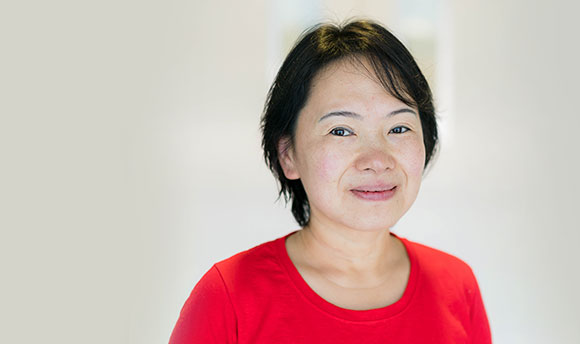This course is now closed for applications for September 2025. Applications will open later in the year for September 2026 entry.
Dietetics (Pre-Registration) - MSc
This MSc in Dietetics (Pre-Registration) course provides graduates of biological sciences with a fast-track route into a fulfilling career, helping people improve their health and wellbeing and their quality of life.
The course has a clinical and health promotion focus and includes three practice placements. On completion you will be able to apply for registration with the Health & Care Professions Council (HCPC) to work as a dietitian.
The course is delivered full time over 22 months.
Why QMU?
- Reputation and experience: Dietetic education at QMU is well established, extremely popular and well respected.
- Employability: The profession has excellent graduate employability rates and graduates go on to work in a variety of positions both in the NHS and/or in public health, health promotion, private healthcare, government, academia and in industry.
- Placements enable you to put your learning into practice: The course delivers theoretical and practical campus-based learning with three integrated periods of practice-based learning enabling you to develop key knowledge, skills and attributes as a trainee dietitian and to meet and evidence the necessary competence to enable registration with the Health & Care Professions Council.
- Staff expertise: The teaching team includes four registered dietitians who have strong links with the dietetic profession within Scotland and across the UK.
- Research ensures relevance: The University’s clinically relevant research, along with the broad range of experience of the teaching team, ensures that the course remains current.
- Facilities: The University campus offers excellent facilities for learning in relation to this course of studies including simulated clinical skills suites, clinical and biochemistry laboratories and food development laboratories. Practice-based learning opportunities are provided within a variety of appropriate NHS and third sector, health and care facilities and settings.
- Professional accreditation/registration: This course provides eligibility to apply for registration as a dietitian with the Health & Care Professions Council and is accredited by the British Dietetic Association.
Dietetics is the management of diseases that are amenable to dietary intervention, and the prevention of nutrition-related disorders. A dietitian influences food selection and eating behaviour of an individual based on specific nutritional or food requirements.
As a dietitian, you will translate scientific information about nutrition into practical advice to help people make health-conscious decisions about food. You will assess, diagnose and treat diet-related problems and aim to raise awareness of the link between food, health and disease to prevent future problems and treat existing nutrition-related problems. Dietitians are a key part of the healthcare team and are the only nutrition professionals to be statutorily regulated.
The course takes you through a clinically and practically focused study of disease, health, food and nutrition. With a clinical and health promotion focus, the course includes three practice-based placements that allow students to apply and consolidate their theoretical learning.
Structure and exit awards
To be awarded the MSc you will be required to complete 320 academic credits and pass the competency-based practice placements.
You must complete the full MSc (320 credits) to be eligible to register with the Health & Care Professions Council and work as a dietitian.
Single module study is not available.
Teaching, learning and assessment
The course delivers theoretical and practical campus-based learning with three integrated periods of practice-based learning.
The emphasis is on student-centred learning where your previous knowledge and skills are used to develop your new subject area. Learning activities include lectures, tutorials, workshops and practical classes and are guided using web-based supporting materials. You will also complete three practical placements to enable the integration of theoretical knowledge with practical experience.
A variety of assessment methods are used across the course. A small cohort ensures that individuals receive excellent support and benefit from sharing their experiences with classmates.
Placements
You will complete three periods of placement within the health and care sector. The first placement includes 150 hours of practice-based learning split between the NHS, care and University setting alongside visits to third-sector organisations. This practice-based learning occurs on a set day in the first semester of year 1 and for a week at the start of semester 2. The second and third period of placement occurs within a variety of settings based within the NHS. Placement locations are randomly allocated as part of a Scottish-wide placement system. They can take place anywhere across Scotland. Fulfilment of placement hours is a compulsory aspect to completion of the course and you should be available to undertake these from the start date of the course.
Specialist facilities
QMU offers a variety of modern spaces for use by both our Master of Dietetics (MDiet) and MSc in Dietetics (Pre-Registration) courses. Students have access to chemistry and microbiology laboratories for practical science-based classes along with a fully equipped teaching kitchen and sensory suite for food-based classes. Practical rooms and a simulated ward environment are utilised for teaching and development of clinical skills. In addition, students have access to appropriate equipment for completing nutritional assessments which is incorporated into teaching across all years of the course. QMU also has an allotment/community garden and students can also access and become involved in the community garden activities.
Teaching hours and attendance
Each module is equivalent to a notional 200 hours of work (or multiple thereof), which is made up of attendance in class, online learning and independent work. The structure of each module is different with different attendance requirements for each timetabled module.
Over an average semester the expectation is that during 14 weeks of teaching students will undertake approximately 40 hours per week of student effort, including contact classes, online learning and independent study time. Students will complete the course via a full-time route and will be expected to attend all timetabled teaching from the start date of the course.
All placements are completed on a full-time basis and in line with the requirements of the dietetic service, normally Monday to Friday, 9am–5pm.
Class sizes
Normally there are 12-15 students enrolling on the course each year. Most of the classes are delivered alongside our undergraduate Master of Dietetics (MDiet) students.
Teaching staff
You can read more about the teaching staff on this course at the bottom of this page. Please note that teaching staff is subject to change.
You will study the following modules:
- Introduction to Dietetic Practice (Placement A) (20 credits): This module includes 150 hours of practice-based learning split between practice, third sector and university settings. The module will introduce and begin to develop students’ knowledge and awareness of the dietitian's role within health and social care settings.
- Essentials of the Dietetic Management (20 credits): This module will provide you with a broad and integrated knowledge and understanding of the dietetic management of disease and to further develop the relevant professional skills and techniques required to effectively and sustainably manage individuals, groups and populations within the context of inter-professional working
- Nutrition Through the Life Course (20 credits): This module will allow you to apply and critically evaluate the scientific principles and nutritional needs of individuals throughout the life course and in different sub-groups of the population in the community.
- Disease Aetiology and Management (20 credits): This module will promote an integrated knowledge of the common disorders and treatments of the gastrointestinal tract, of renal and cardio-respiratory systems and an understanding of the metabolism and endocrinology of key metabolic disorders.
- Dietetic Management of Long-Term Conditions (20 credits): This module will provide you with a critical and integrated knowledge and understanding of the dietetic management of long-term conditions children, young people and adults. It will also further develop the relevant professional skills and techniques required to effectively and sustainably manage those living with long term conditions within a multi-professional health and social care landscape.
- Epidemiology in Public Health (20 credits): Students will gain a critical and applied understanding of how epidemiological research is used in the field of public health and will be able to analyse and interpret a real-life public health dataset and make recommendations for public health practice/health promotion based on findings.
- Developing Dietetic Practice (Placement B) (60 credits): This module (includes 12 weeks practice-based learning. The module will enable students to apply their broad and integrated theoretical knowledge and further develop the range of skills needed to work as a Dietitian with a range of client groups and within a range of care settings.
- Innovative and Emerging Practice (40 credits): This module will provide students with an applied and critical knowledge and understanding of innovative and emerging dietetic practice.
- Consolidating Dietetic Practice (Placement C) (60 credits): This module includes 12 weeks practice-based learning. The module will enable students to become competent in translating theory into practice to demonstrate competency in the range of skills required to work as a graduate Dietitian.
- Applying Skills of Critical Enquiry (40 credits): The module aims to enable students to develop and apply the skills of research and enquiry to produce a small-scale study which demands a professional approach, academic rigour, independence and self-direction.
Graduates enjoy a good variety of career options. Most graduates normally choose to work within the NHS as dietitians. Others will work in health education, health promotion, general practice, private healthcare and government advisory posts. Opportunities also exist in the food and pharmaceutical industries in, for example: food labelling, nutrient profiling, product and recipe development, product evaluation and special diet foods. Some graduates may apply for the opportunity to study for a higher degree (ProfDoc or PhD).
Entry requirements
A good honours degree (minimum upper second-class honours (2:1) or above is required that includes significant emphasis on human physiology and biochemistry.
An application should illustrate what has been done by the applicant to research and understand more about the role of a dietitian. In particular, evidence of understanding the skills, attributes and values required to work as a dietitian should be shown in the application supporting statement.
Where an applicant has an undergraduate degree in a related subject but does not have the required biological science content they can be considered for entry to the course as an associate student if they can demonstrate the appropriate professional skill development following their undergraduate degree (e.g. nursing or psychology degree).
As a successful associate student, they will complete the biological science content in Years One and Two of the undergraduate Master of Dietetics (MDiet) (consisting of two modules in semester 1 and one module in semester 2). If they complete these modules with a pass of >60%, this would then permit entry into the MSc Dietetics (pre-registration) course the following year.
We appreciate that it can be difficult to get shadowing experience, so relevant personal and professional experience that demonstrates development of key transferable skills to those required by dietitians would be beneficial.
International students: You will be required to provide evidence of English language competence at no less than IELTS 7.0 and no individual component score below 6.5.
Other requirements
A satisfactory criminal records check from the Protection of Vulnerable Groups (PVG) Scheme, an occupational health check and personal indemnity insurance (normally through membership of the professional body) are required.
Other costs
- The cost of professional indemnity insurance is the responsibility of the student. For more information on this, visit the PG 2025 fees page on our website.
- The additional costs associated with placement travel and accommodation are the responsibility of the student. Students who receive SAAS funding may be able to claim for some of these expenses to be reimbursed.
- Uniform, PVG and badge costs – please see PG 2025 fees page on our website.
Disability/health conditions
If you have a disability, long-term physical or mental health condition, or learning disability, it should not stand in the way of your studying at QMU. However, if you are not sure whether your disability might be a barrier in your studies or in relation to the professional standards, please contact the disability service who will be able to have a conversation with you about reasonable adjustments and supports available to you.
Applying for this course
For more information on applying, or to apply for this course, please follow the links in the 'Start your application' box at the top right of this page.
Application deadline
This course is now closed for applications for September 2025. Applications will open later in the year for September 2026 entry.
Contact Alison Lyles (Programme Leader) or contact Admissions
- The delivery of this course is subject to the terms and conditions set out in our 2025/26 Entry - Terms and Conditions (Postgraduate).
- The information on this page is correct at the time of posting (October 2024) but is subject to change due to a routine re-validation in 2025. In the event that modules change, QMU will seek to use reasonable endeavours to ensure that there is no detrimental impact on students. Please keep an eye on this page for updates.
Specialist facilities for Food, Nutrition and Dietetics
Become your best you: study at QMU
Start Your Application
Course Overview
Join us at one of our Postgraduate Open Events
Find out about online and in-person opportunities to meet with us to find out more about our postgraduate courses and study at QMU.
Postgraduate Open Events - More Info and BookingsCourses You Might Also Like
- MSc Art Psychotherapy
- MSc Diagnostic Radiography (Pre-Registration)
- MSc Dramatherapy
- MSc Music Therapy
- MSc Occupational Therapy (Pre-Registration)
- MSc Physiotherapy (Pre-Registration)
- MSc Play Therapy
- MSc Podiatry (Pre-Registration)
- MSc Speech and Language Therapy (Pre-Registration)
- MSc Therapeutic Radiography (Pre-Registration)
- MSc Audiology (Pre-Registration)










